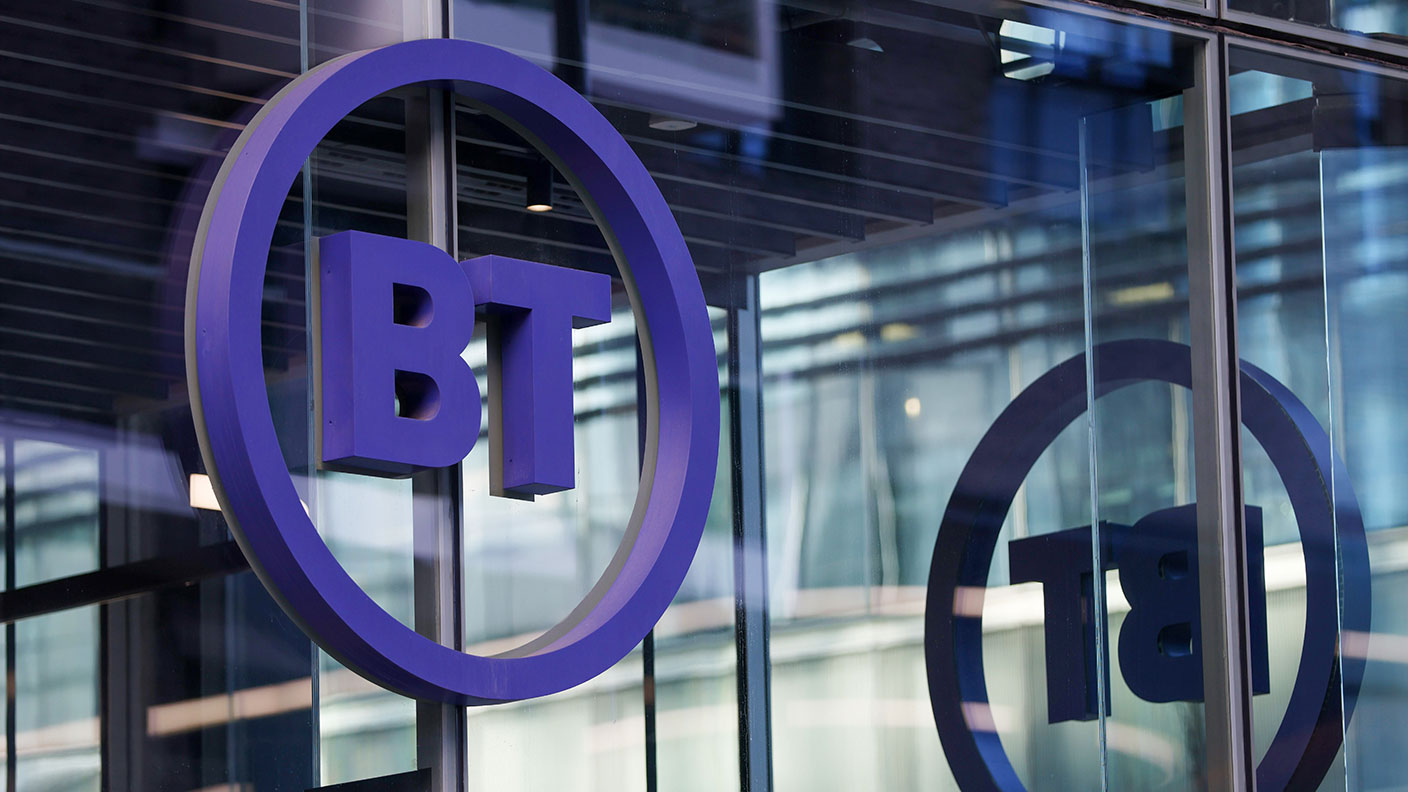Why higher interest rates could be good news for BT
A rise in interest rates could deliver a nice boost to BT, one of Britain’s largest companies, says Phil Oakley. Here’s why.
Get the latest financial news, insights and expert analysis from our award-winning MoneyWeek team, to help you understand what really matters when it comes to your finances.
You are now subscribed
Your newsletter sign-up was successful
Want to add more newsletters?

Twice daily
MoneyWeek
Get the latest financial news, insights and expert analysis from our award-winning MoneyWeek team, to help you understand what really matters when it comes to your finances.

Four times a week
Look After My Bills
Sign up to our free money-saving newsletter, filled with the latest news and expert advice to help you find the best tips and deals for managing your bills. Start saving today!

The markets and financial media are obsessed with interest rates these days.
Sometimes it seems that the daily casino yo-yoing of share prices is purely driven by comments from leading central bankers such as Mark Carney in the UK or Janet Yellen in the States.
So when Carney hinted last week that UK rates could rise sooner than expected perhaps in 2014 a new round of market chatter and speculation was triggered.
MoneyWeek
Subscribe to MoneyWeek today and get your first six magazine issues absolutely FREE

Sign up to Money Morning
Don't miss the latest investment and personal finances news, market analysis, plus money-saving tips with our free twice-daily newsletter
Don't miss the latest investment and personal finances news, market analysis, plus money-saving tips with our free twice-daily newsletter
But there's one point that hasn't had much coverage: rising rates could deliver a nice boost to one of the UK's largest companies BT (LSE: BT.A).
Will rates actually rise?
When Carney hinted that a rate rise would come soon, the price of shares and bonds went down a bit. Carney said yesterday that he was surprised at that reaction. But when people delved into the latest minutes of the Monetary Policy Committee (MPC) yesterday, it seemed that a rate rise should not be seen as a certainty this year.Some MPC members still think the economy has plenty of spare capacity, which means higher inflation is not likely to rear its ugly head. So bonds went back up again.
For what it's worth, I don't think interest rates are going up. There's certainly not much inflation about at the moment according to the official statistics. This is borne out too if you go to the supermarket, the petrol station or read your latest electricity bill. Prices are not going up much. In fact, lots of them are going down.
Rising interest rates have a silver lining
BT is certainly prospering at the moment. Its fibre optic broadband and move into televised sport is paying off. The company is generating shedloads of cash and is increasing dividends at 15% for the next couple of years. But there's one thing that worries even the bulls of BT shares its pension fund deficit.
Final salary pension funds are a very dry but important subject. The promise to pay employees a proportion of their final salaries in retirement is a wonderful deal for staff. But it can be a serious burden for employers.
At the end of March, BT's pension fund had a £7bn hole in it (it had assets of £40bn and liabilities of £47bn). If you are a shareholder, this pension fund hole is like a big lump of debt. More importantly, it has to be paid before you get your dividend. BT is paying an extra £295m a year into the fund for the next seven years to try and plug the hole. Big pension fund deficits mean lower share prices.
Final salary pension funds have been one of the biggest victims of low interest rates. That's because of the way companies have to account for these pension schemes. The promises to pay pensioners in the future have to be given a value in today's money.
That's done by a process called discounting'. Let's imagine that a pension fund's total liability in the future is £1bn. If we want to value that sum in today's money, we have to use a discount rate. So if all the liabilities crystallised in ten years' time they won't you'd discount the £1bn liability at 2% interest a year for ten years.
With such a low discount rate, the liability in today's money will be relatively large, but if the discount rate is 4%, the today's money liability will be smaller.
The discount rate is driven by interest rates, and as interest rates have been kept low, BT's pension fund hole has been getting bigger. That £7bn hole reduces the value of BT shares by 88p per share.
But if interest rates go up then the deficit in BT's pension fund could get smaller. For every 0.25% increase in interest rates, BT's liability goes down by £1.6bn, and its equity value increases by 20p per share. Yes, interest rates will affect the values of bonds in the pension fund, but probably not by as much to offset the reduction in the liability.
BT shares have been on a good run over the last few years but I think there's still more to go for. Some people may worry about it spending too much on televised football rights, but I think that risk is overplayed. Its fibre network gives it lots of advantages of Sky, while BT can make lots of money on broadband subscriptions with football. The shares are not desperately expensive on 13.4 times projected earnings and a growing dividend yieldof 3.2%.
And if you believe interest rates are going up, the pension fund provides another boost.
Our recommended articles for today
Investors beware: these are not benign times
What thousands of angry cabbies mean for your investments
Get the latest financial news, insights and expert analysis from our award-winning MoneyWeek team, to help you understand what really matters when it comes to your finances.
Phil spent 13 years as an investment analyst for both stockbroking and fund management companies.
-
 Should you buy an active ETF?
Should you buy an active ETF?ETFs are often mischaracterised as passive products, but they can be a convenient way to add active management to your portfolio
-
 Power up your pension before 5 April – easy ways to save before the tax year end
Power up your pension before 5 April – easy ways to save before the tax year endWith the end of the tax year looming, pension savers currently have a window to review and maximise what’s going into their retirement funds – we look at how
-
 How have central banks evolved in the last century – and are they still fit for purpose?
How have central banks evolved in the last century – and are they still fit for purpose?The rise to power and dominance of the central banks has been a key theme in MoneyWeek in its 25 years. Has their rule been benign?
-
 Why investors can no longer trust traditional statistical indicators
Why investors can no longer trust traditional statistical indicatorsOpinion The statistical indicators and data investors have relied on for decades are no longer fit for purpose. It's time to move on, says Helen Thomas
-
 How will markets react to the next Bank of England rate decision?
How will markets react to the next Bank of England rate decision?The Bank of England is due to announce its latest interest rate decision on Thursday, 2nd November, but how will markets react?
-
 Property market flatlines as average mortgage rate rises to 6%
Property market flatlines as average mortgage rate rises to 6%Two-year mortgage rates have risen to above 6% for the first time since September.
-
 BT is making progress and the dividend is back – but is it time to buy yet?
BT is making progress and the dividend is back – but is it time to buy yet?Analysis Investors in telecoms giant BT have seen dismal returns over the last 15 years. But there are signs that it is starting to turn things around, says Rupert Hargreaves. So should you buy BT shares?
-
 Football’s £5bn bonanza
Football’s £5bn bonanzaFeatures Competition between Sky and BT for rights to screen the footie has handed a £5bn windfall to the English Premier League. Can that really be a good deal? Simon Wilson reports.
-
Sell your telecoms shares – this merger madness is bound to end in misery
Opinion A lot of money will be spent in the telecoms tie-up frenzy – but much of it will be wasted, says Matthew Lynn.
-
A shake-up for the sleepy telecoms sector
Features The shape of the telecoms sector is changing, as BT's ambitious plans show.